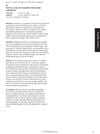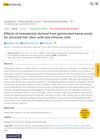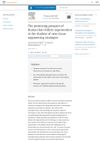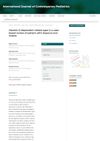 January 2023 in “Skin appendage disorders”
January 2023 in “Skin appendage disorders” Hair loss is common in autoimmune diseases and can be an early sign of the condition, often requiring prompt treatment to prevent permanent damage.
 April 2022 in “Journal of The American Academy of Dermatology”
April 2022 in “Journal of The American Academy of Dermatology” The document suggests that nerve issues might contribute to hair loss and that testing sensation could predict these nerve problems.
March 2022 in “Journal of cosmetic dermatology” Botanical extracts can help treat hair loss in people with certain genetic conditions.
January 2022 in “International journal of advanced engineering research and sciences” Hair extensions can improve self-esteem but may cause hair loss if used improperly.
 February 2020 in “Scholars international journal of traditional and complementary medicine”
February 2020 in “Scholars international journal of traditional and complementary medicine” Ayurveda treats hair problems like hair loss and dandruff by balancing body elements and using natural remedies like Indian Gooseberry and false Daisy.
 April 2018 in “Journal of Investigative Dermatology”
April 2018 in “Journal of Investigative Dermatology” Claudin-1 and Claudin-3 are crucial for keeping hair follicle structure and preventing a type of hair loss called telogen effluvium.
 April 2010 in “Plastic and Reconstructive Surgery”
April 2010 in “Plastic and Reconstructive Surgery” The technique can potentially treat hair loss by using a matrix to grow new hair from cells.

Germinated hemp seed extracts help prevent hair loss and promote hair growth.
 February 2024 in “Tissue & Cell”
February 2024 in “Tissue & Cell” New tissue engineering strategies show promise for regenerating human hair follicles, which could improve hair loss treatments.
 October 2023 in “Recent Trends in Pharmaceutical Sciences and Research”
October 2023 in “Recent Trends in Pharmaceutical Sciences and Research” The paper concludes that animal models help in understanding hair loss causes and developing new treatments.
 May 2023 in “Brazilian Journal of Animal and Environmental Research”
May 2023 in “Brazilian Journal of Animal and Environmental Research” Photobiomodulation effectively treats hair loss in dogs with black hair follicular dysplasia.
 April 2023 in “Journal of Investigative Dermatology”
April 2023 in “Journal of Investigative Dermatology” Ganoderma lucidum extract can potentially reduce stress-induced hair loss by slowing down premature hair aging and removing harmful substances.
January 2021 in “Hair therapy & transplantation” Smoking may speed up hair loss.
January 2020 in “Journal of the Brazilian Chemical Society” Tiny lipid particles loaded with a hormone gather in hair follicles, which may help treat hair loss.
April 2023 in “Journal of Investigative Dermatology” New drug targets for hair loss treatment were identified by studying cell interactions in hair follicles.
 55 citations,
May 2017 in “Current stem cell research & therapy”
55 citations,
May 2017 in “Current stem cell research & therapy” Using fat-derived stem cells for hair loss treatment is safe and effective, improving hair growth and patient satisfaction.
47 citations,
February 1998 in “Journal of bone and mineral research” A specific gene mutation causes vitamin D-resistant rickets and hair loss.
35 citations,
October 2000 in “Dermatologic clinics” A scarring hair loss condition mainly affects middle-aged women of African descent, impacting their quality of life, with treatments more effective when started early.
11 citations,
March 2020 in “The journal of investigative dermatology/Journal of investigative dermatology” A specific group of skin stem cells was found to help maintain hair follicle cells.
11 citations,
January 2015 in “PubMed” A specific laser treatment can promote hair growth in mice by increasing certain protein levels.
 11 citations,
September 2014 in “International Journal of Molecular Sciences”
11 citations,
September 2014 in “International Journal of Molecular Sciences” Mycophenolate helps reverse hair loss effects caused by IFN-γ by activating a key hair growth pathway.
1 citations,
June 2022 in “Journal of Cosmetic Dermatology” Two specific genetic markers increase the risk of hair loss in Asian populations.
 1 citations,
January 2017 in “Elsevier eBooks”
1 citations,
January 2017 in “Elsevier eBooks” The document concludes that new treatments for hair loss may involve a combination of cosmetics, clinical methods, and genetic approaches.
 November 2023 in “The journal of investigative dermatology/Journal of investigative dermatology”
November 2023 in “The journal of investigative dermatology/Journal of investigative dermatology” Cancer treatment drugs can cause permanent hair loss by damaging hair follicle stem cells, but a specific inhibitor might reverse this effect.
 January 2023 in “International Journal of Contemporary Pediatrics”
January 2023 in “International Journal of Contemporary Pediatrics” A rare genetic disease causes rickets and often hair loss in young children, which can improve with specific treatments.
 April 2017 in “Journal of Investigative Dermatology”
April 2017 in “Journal of Investigative Dermatology” PRC1 influences skin stem cell development by both turning genes on and off, affecting hair growth and skin cell types.
 June 2008 in “Springer eBooks”
June 2008 in “Springer eBooks” The document concludes that permanent hair loss conditions are complex, require early specific treatments, and "secondary permanent alopecias" might be a more accurate term than "secondary cicatricial alopecia."
 August 2021 in “Journal of Investigative Dermatology”
August 2021 in “Journal of Investigative Dermatology” Stress causes hair loss by making the body produce cortisol, which stops hair cells from growing.
 October 2018 in “Vestnik dermatologii i venerologii”
October 2018 in “Vestnik dermatologii i venerologii” Certain growth factors affect hair loss in women and could be targeted for treatment.
 March 2023 in “Research Square (Research Square)”
March 2023 in “Research Square (Research Square)” Immune changes and specific genes contribute to male hair loss.




















